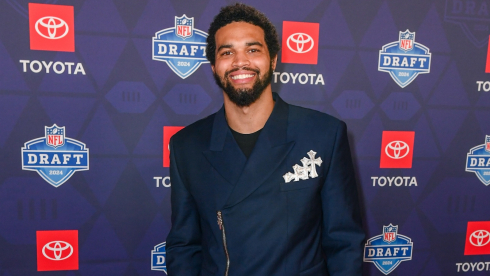The first time Spike Lee raised money to shoot a film was for his 1986 directorial debut. She’s Gotta Have It became a phenomenon that not only established the 29-year-old as a youthful, hip, major talent, but also lit the fuse for a Black film renaissance. Now 56 and an auteur of Oscar-nominated films like Do The Right Thing and 4 Little Girls, Lee is at it again, taking the indie route to finance his next project, described as a film about “human beings addicted to blood.”
Since July 22, the director’s become the face of crowdfunding (a business model often associated with starving artists) because of his Kickstarter campaign, which ended yesterday afternoon. When the drive reached its goal of $1.25 million last Thursday, Lee threw a party at the Brooklyn Bowl to celebrate the occasion. “People are fired up,” Lee told me the next day, perched on a bench in Harlem’s St. Nicholas Park. “They’re looking forward to it.”
Lee was uptown for the ImageNation Outdoors Festival airing of his 2002 documentary, Jim Brown: All-American. With hip-hop booming from event speakers, hundreds of people carrying food, blankets and chairs poured onto the great lawn as Lee talked. Before introducing his doc to the crowd, EBONY.com asked Lee why he’s drawn to certain sports figures, how it felt to watch another director’s take on Jackie Robinson’s story, and if he lets “haters” get to him.
EBONY: Why is this Jim Brown documentary special to you?
Spike Lee: Jim Brown is one of the most unique individuals I ever met. I mean, think of his life: the greatest football player ever, the greatest lacrosse player. At one time, he was one of the biggest stars in Hollywood. Activist. He’s always been relevant. So it was just a pleasure to do the film, and I was happy that Jim allowed us to come into his life, because we got very thorough.
EBONY: Although it traces his Hall of Fame NFL career, the documentary is definitely not a hagiography. I noticed you didn’t pull punches when it came to Brown’s private life.
SL: Oh, yeah. Jim insisted that. He said, “Spike, if you’re going to do this, ask me anything you want. There’s no reason for me doing it if you can’t ask me stuff that’s going to be difficult.” In any of our documentaries, we deal with the complexities of human beings. We’re not all saints. Recently, I just directed Mike Tyson: Undisputed Truth on Broadway. We filmed it for HBO. It’s good when people stand up and talk about the good and bad things they did; just be honest with people. And there’s definitely a connection between Mike Tyson and Jim Brown as far as the ups and downs of their lives.
EBONY: Both are former athletes who’ve gone on to have success in Hollywood— Tyson in The Hangover movies and Brown as an action star in The Dirty Dozen, 100 Rifles and Slaughter’s Big Rip-Off. Have you and Brown ever sat and talked about the type of movie you might have done together in the ’70s, when he was his prime?
SL: I really don’t deal with hypotheticals. I was too young [when Jim started making movies]. I was born in 1957 and that’s it. I can’t change time. I was just happy that Jim was in two of my films: He Got Game and She Hate Me. So that’s great.
EBONY: Another barrier-breaking sports icon you wanted to immortalize on film is Jackie Robinson, whose story was told in the modest hit 42. Given your ties to Robinson, was that film particularly hard for you to watch?
SL: I’ve never seen it.
EBONY: I guess that’d be like watching another man go to bed with your woman.
SL: Sort of like that. [Laughs] And it’s going to be the same way with James Brown too. [Lee was attached to direct a biopic on the Godfather of Soul, now being developed for The Help director Taylor Tate.]
EBONY: So is the Jackie Robinson story one of your passion projects that’ll never see the light of a movie projector?
SL: You can’t do that movie again. They already did it.
EBONY: Your next film, Old Boy, seems to be a departure from your previous work. When audiences saw the 2003 original, I doubt anyone thought, “Yeah, that was cool. But wouldn’t a Spike remake be the business?”
SL: Well, we’re calling it a reinterpretation because it’s a whole different mindset. We’re not trying to remake that film. People like the trailer, so hopefully they’ll come see the film Thanksgiving weekend.
EBONY: How did you come to direct Old Boy?
SL: I got asked… And Josh Brolin and I have been talking about working together for years, so it just finally happened.
EBONY: I see you transported the story from a nondescript city in South Korea to New Orleans, which is almost a second home for you these days. Was that location change your idea?
SL: No, the screenwriter came up with that. We shot in New Orleans, but in the movie it’s supposed to be a nondescript urban United States city.
EBONY: How did you handle the memorable fight scene in which the protagonist hammers through a hallway of bad guys with a knife stuck in his back?
SL: You got to see it.
EBONY: How many takes did you do?
SL: You got to see it.
EBONY: Are you really not going to tell us anything?
SL: I’m not really talking about the film. As a director, I feel that people should see the movie. I never understood the concept of showing everything in the trailer. Why go to a movie if there’s no surprise? I can’t do it like that.
EBONY: For your next film, described as “human beings addicted to blood,” you turned to Kickstarter. Many, including Steven Soderbergh, who kicked in 10 Gs, came out and supported the project. Just as many thought, “What is Spike Lee doing up here asking for donations?
SL: It’s not a donation. You make a pledge and you get something. Someone is not donating ten fu**ing thousand dollars for me. They’re going to a motherfu**ing Knick game. You know how much those tickets cost? Those tickets cost $3,500! For every monetary [value], you get a reward. It’s a pledge.
EBONY: Did you anticipate the controversy that your Kickstarter campaign would stir up?
SL: Before I did the campaign, I sat down with the cofounders of Kickstarter, and they told me what was going to happen. It happened to the makers of Veronica Mars. It happened to Zach Braff. [That filmmaker raised over $2 million for Wish I Was Here, a film he will write and direct.] But since when would that stop me from doing something, because someone might not like it? I wouldn’t be doing motherfu**ing films for almost three decades if every time I did something that someone didn’t like I went in a fu**ing cocoon and just hid there and didn’t make my art.
EBONY: Well, congratulations on reaching your goal.
SL: Yeah, but here’s the thing. People say what they want. We’re making this movie. We got that motherfu**ing money. [Laughs] Third largest campaign in Kickstarter history. And I got to thank everybody that helped us. It wasn’t me alone. It was the hardworking people at 40 Acres and a Mule and the people that came out and supported it.
EBONY: How will you spend the extra $100,000 your campaign raised?
SL: Every single penny goes up on the screen.













